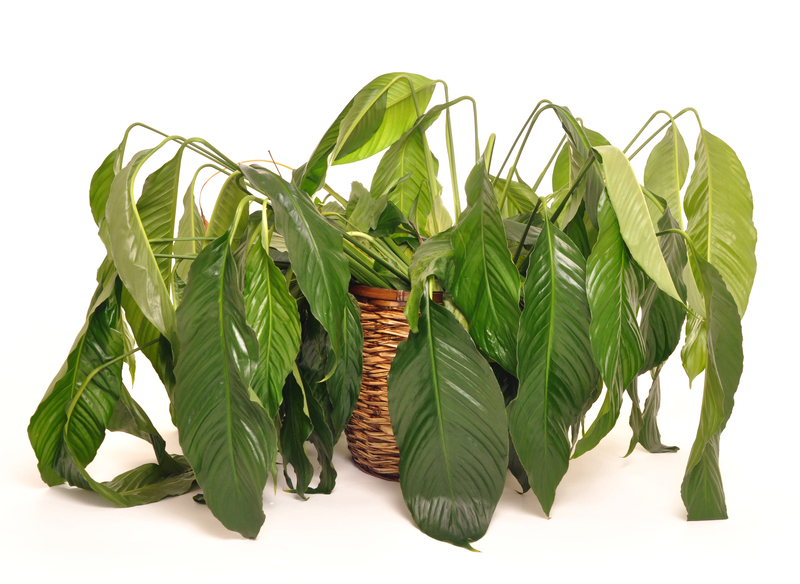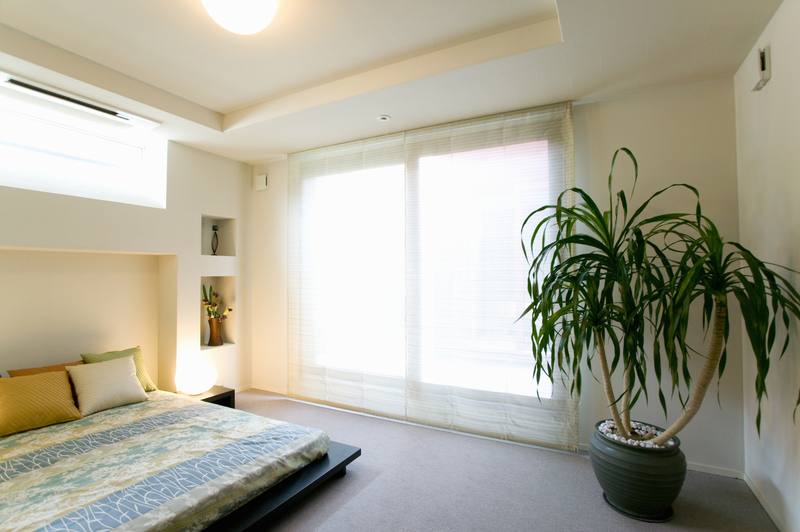Greening Your Space: Tips for a Flawless Herb Garden
Posted on 24/05/2025
Transforming your home into a lush, fragrant oasis is easier than you think! If you've ever dreamt of plucking fresh basil, mint, or rosemary for your meals, it's time to embrace herb gardening. Whether you want kitchens brimming with verdant life or balconies full of thriving green leaves, creating a flawless herb garden will elevate your space, cuisine, and mood. In this comprehensive guide, you'll discover expert tips, essential techniques, and creative ideas for cultivating a perfect herb garden indoors or outdoors.

Why Start an Herb Garden?
Herb gardens do more than supply fresh seasonings. They:
- Elevate your cooking: Fresh herbs provide more robust flavors than dried ones.
- Improve air quality: Many herbs purify indoor air and emit pleasing fragrances.
- Boost your mood and productivity: Tending plants reduces stress and adds natural beauty to any space.
- Add value: A thriving garden can increase property appeal and curb appeal.
- Encourage sustainability: Growing your own herbs means less waste and fewer store-bought plastics.
Whether you have a sprawling backyard or a sunny windowsill, greening your space with a flourishing herb garden is within reach!
Choose the Perfect Herbs for Your Flawless Garden
The first step to a perfect herb garden is selecting the right varieties. Consider:
- Your climate & growing conditions: Some herbs (like rosemary or lavender) prefer drier climates, while others (like basil or cilantro) thrive in more humid environments.
- Your culinary preferences: Start with herbs you use often, such as
- Basil
- Mint
- Parsley
- Chives
- Thyme
- Dill
- Coriander/Cilantro
- Rosemary
- Oregano
- Available space: Some herbs grow large--choose compact varieties for small areas or containers.
Try mixing classic kitchen herbs with more unusual varieties, like lemon balm or tarragon, for a unique garden experience.
Optimal Placement: Finding the Ideal Spot
Herbs love sunlight! For a flawless herb garden, ensure your chosen spot receives at least 6 hours of light daily. Here are placement tips:
- South-facing windows are best for indoor herb gardens.
- For outdoor gardens, pick a spot shielded from strong winds but still sun-drenched.
- Avoid areas near air conditioners, heaters, or drafty windows that can stress your plants.
- If light is limited, supplement with grow lights -- especially helpful in winter!
Regularly rotate pots to ensure all parts of your herbs get an even amount of sunlight.
Container Gardening vs. In-Ground
Herb gardening is flexible. Containers make it easy to start herbs indoors or on balconies, while in-ground beds allow for more growth outdoors. Consider these options:
Benefits of Containers:
- Mobility--move herbs as needed for sunlight or weather protection.
- Control over soil quality and drainage.
- Ideal for renters or those with limited space.
- Helps limit aggressive spreaders, like mint.
Advantages of In-Ground Herb Gardens:
- Best for established gardens or large yards.
- Easier for perennial herbs to overwinter and spread naturally.
- Less frequent watering compared to containers.
Soil Preparation: Laying the Foundations for Growth
Quality soil is the secret to a bountiful, flawless herb garden. Follow these tips:
- Use a well-draining potting mix, ideally one formulated for herbs or vegetables.
- If gardening outdoors, enrich the soil with compost or aged manure before planting.
- Maintain a pH level of 6.0 to 7.0 for most herbs.
- Avoid heavy clay soils or those that retain too much moisture, as herbs dislike "wet feet."
Tip: Add a layer of small stones or pebbles at the bottom of containers for proper drainage.
Watering Wisdom: Striking the Right Balance
Overwatering is the number one mistake in herb gardening. Here's how to prevent it:
- Check soil moisture with your finger; water only when the top inch feels dry.
- Water thoroughly until it drains from the pot's bottom, but don't let your herbs sit in soggy soil.
- Use pots with drainage holes and saucers.
- In-ground herbs may need less frequent watering once established.
Remember: Mediterranean herbs (like rosemary, thyme, and oregano) prefer drier conditions, whereas leafy herbs (like basil or parsley) need more regular moisture.
Feeding Your Herb Garden
Avoid over-fertilizing herbs, which can lead to weak, leggy growth. For a flourishing herb garden, try these feeding strategies:
- Use a balanced, organic fertilizer diluted to half strength, once a month during the growing season.
- Compost tea or fish emulsion works wonders for organic gardens.
- Skip winter feeding--most herbs go dormant or slow down dramatically.
Tip: Monitor your herbs for yellowing or slow growth, which can signal a need for nutrients.
Harvesting & Pruning Techniques for Thriving Herbs
Regular harvesting not only provides fresh flavor for your kitchen but also encourages bushier, healthier plants. Here's how to harvest like a pro:
- Pick herbs in the morning after the dew dries but before the sun is strong.
- For leafy herbs such as basil or mint, snip a few inches above a leaf node. This signals the plant to branch out.
- Never cut more than one-third of the plant at once to avoid stressing it.
- Remove flower buds unless you want your herbs to go to seed. Flowering typically signals the end of leafy growth.
Don't be afraid to prune! Frequent harvesting is the secret to a thick, flawless herb garden.
Creative Design Ideas for Greening Your Space
A flawless herb garden is as beautiful as it is useful. Consider these stylish options when designing your green space:
Vertical Herb Gardens:
- Use wall-mounted planters, repurposed pallets, or hanging pockets to maximize small spaces.
- Combine herbs of varying heights and colors for a living, edible artwork.
Windowsill Herb Gardens:
- Arrange small pots or a long window box for convenient kitchen access.
- Mix and match terracotta, ceramic, or upcycled containers for added charm.
Outdoor Raised Beds:
- Define your herb patch with a simple wooden frame, bricks, or even cinder blocks.
- Group herbs by water and sunlight needs for easy care and a unified look.
Herb Spirals and Decorative Pots:
- Build a spiral bed with rocks or bricks--a stunning and space-saving solution that provides microclimates for different herbs.
- Use large, decorative containers on patios or balconies for instant impact.
Protecting Your Herb Garden Through the Seasons
Seasonal care keeps your herb garden thriving year-round:
- Bring tender herbs like basil, parsley, and cilantro inside before the first frost.
- Consider growing perennial herbs outdoors, such as thyme, oregano, and sage; mulch roots in winter to protect from freezes.
- Reduce watering and stop fertilizing during colder months.
- Prune woody herbs in late winter/early spring to encourage fresh new growth.
Tip: Indoor herb gardens often need extra humidity in winter; set pots on trays of moist pebbles or use a small humidifier.
Common Issues: Pests, Diseases, and Solutions
Healthy herbs resist most problems, but keep an eye out for:
- Aphids or spider mites: Rinse with water or use an organic insecticidal soap.
- Fungal diseases: Avoid overhead watering and overcrowding. Ensure good air circulation.
- Root rot: Occurs from overwatering--use well-draining soil and empty saucers regularly.
- Powdery mildew: Remove affected leaves and increase airflow.
Regular inspection and proper spacing help maintain a flawless, pest-free garden.
Enjoying the Fruits of Your Herb Garden
Your herb garden's bounty extends far beyond the kitchen:
- Add fresh herbs to teas, salads, sauces, pestos, and marinades for unbeatable flavor.
- Dry or freeze excess harvests for year-round enjoyment.
- Create herbal bath sachets, home fragrance blends, or soothing skin balms.
- Gift pretty bundles or potted herbs to friends and neighbors.
The possibilities are endless!
Nothing matches the joy (and taste) of herbs you've grown yourself.

Conclusion: Achieve a Flawless Herb Garden Anywhere
Greening your space with a flawless herb garden is simpler than you might expect. Whether you're cultivating pots on your windowsill or designing an impressive outdoor bed, following these tips will lead you toward lush growth, aromatic harvests, and a refreshed living environment. Embrace the journey--from choosing plants to savoring your own culinary creations--and watch as your world becomes a touch greener and more delicious every day.

